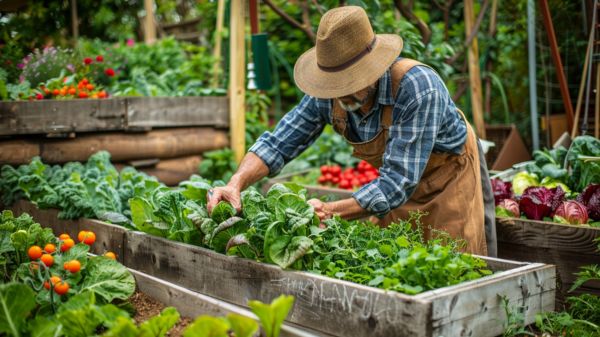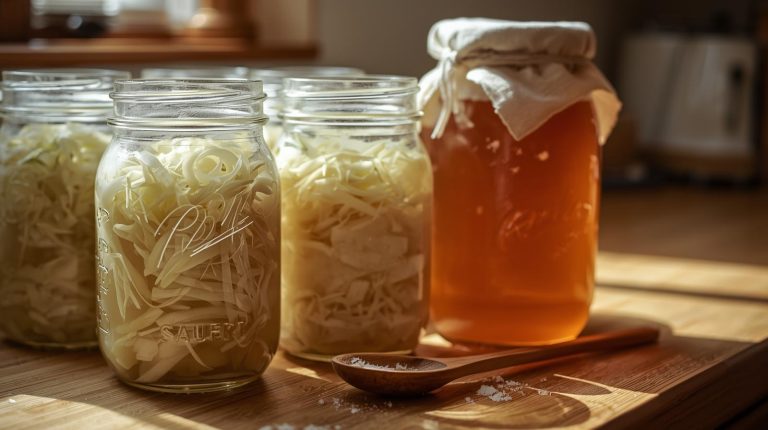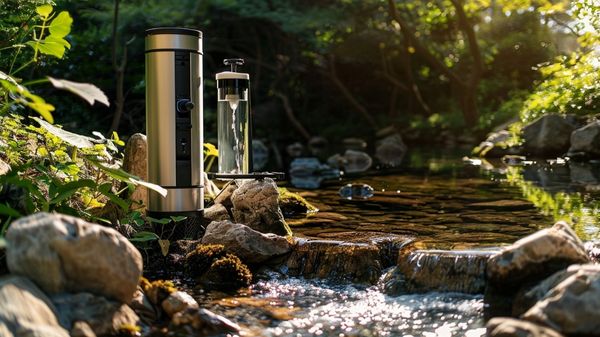Developing a sustainable garden is a crucial pursuit for homesteaders dedicated to promoting both productivity and environmental stewardship. By following eco-friendly gardening techniques, like improving soil health, embracing crop diversity, and utilizing natural pest control, homesteaders can greatly enhance the resilience and yield of their garden.
Additionally, effective water conservation, composting, and the application of organic mulch contribute to a harmonious and flourishing ecosystem. Sustaining pollinators further secures the health of your crops. Interested in converting your garden into an eco-friendly sanctuary? Let’s delve into each of these essential tips in more detail.
Key Takeaways
- Incorporate compost and aged manure to enhance soil fertility and structure.
- Utilize rainwater harvesting and drip irrigation systems for efficient water conservation.
- Practice crop rotation and diversity to naturally manage pests and improve soil health.
- Employ natural pest control methods such as neem oil and beneficial insects.
- Mulch around plants to retain moisture, suppress weeds, and regulate soil temperature.
Enhance Soil Health
To enhance soil health, begin by testing the soil pH and nutrient composition to accurately assess its current condition. This foundational step allows you to identify any deficiencies or imbalances that could impede plant growth. Correcting soil pH and ensuring a balanced nutrient profile is the first stride toward a thriving garden.
Incorporating organic matter is important for fostering a fertile soil environment. Use compost and aged manure to introduce essential nutrients and beneficial microorganisms. These organic materials not only enrich the soil but also improve its structure, promoting better water retention and aeration.
Cover crops play an essential role in sustainable soil management. Planting legumes, such as clover or vetch, can fix atmospheric nitrogen, providing natural fertilization. Additionally, cover crops prevent soil erosion, suppress weeds, and enhance organic matter when turned back into the soil.
Focusing on building nutrient-rich soil will nurture robust plant growth and productivity. Healthy soil is the cornerstone of a successful garden, ensuring good drainage and sustained nutrient availability. Prioritizing soil health through these sustainable practices empowers you to create a self-sufficient and thriving gardening ecosystem.
Related Post: 7 Top Soils for Thriving Indoor Gardens.
Practice Crop Diversity
Embracing crop diversity in your garden frequently improves pest management and promotes soil health through sustainable practices. By integrating a variety of plants, homesteaders can create a resilient ecosystem that naturally deters pests and enriches the soil.
Companion planting is a cornerstone of this approach, where certain plants are grown together to bolster each other’s growth and ward off pests. For instance, marigolds can deter nematodes, while beans can fix nitrogen in the soil, benefiting neighboring crops.
Implementing diverse crops not only contributes to soil health but also aids in breaking pest cycles. Crop rotation, a method where different types of crops are planted in succession, prevents the buildup of soil-borne diseases and pests. This organic gardening practice is essential for maintaining a balanced and thriving garden ecosystem.
Moreover, the visual appeal of a garden with diverse crops cannot be understated. Such gardens are not only functional but also aesthetically pleasing, which further motivates sustainable practices.
Thus, homesteaders aiming for liberation through self-sufficiency can achieve a more robust and healthier garden by practicing crop diversity, enhancing both the ecological balance and productivity of their homestead.
Employ Natural Pest Control
Having established the benefits of crop diversity, it’s equally important to consider natural methods for managing garden pests to maintain a healthy ecosystem. Embracing natural pest control not only promotes biodiversity but also minimizes the environmental impact of synthetic pesticides.
Beneficial insects, such as ladybugs, lacewings, and parasitic wasps, act as natural predators to common garden pests, reducing the necessity for chemical interventions. Here is a table highlighting some effective natural pest control methods:
| Method | Description | Benefits |
|---|---|---|
| Beneficial Insects | Ladybugs, lacewings, and parasitic wasps prey on pests | Reduces reliance on chemicals, supports biodiversity |
| Neem Oil | Organic oil obtained from the Neem tree, disrupts pest life cycle | Environmentally friendly, harmless to beneficial insects |
| Garlic Spray | Natural repellent created from garlic, deters various pests | Safe, eco-friendly |
| Diatomaceous Earth | Powder derived from fossilized algae, dehydrates and eliminates pests | Free of chemicals, plant and soil-friendly |
Utilizing these eco-friendly methods guarantees the garden remains a sanctuary for both plants and beneficial insects. Neem oil, for example, is an efficient substitute for synthetic pesticides, affecting pests without harming beneficial creatures. By embracing these sustainable practices, homesteaders can free their gardens from chemical dependencies, nurturing a healthier and more resilient ecosystem.
Conserve Water Efficiently
To conserve water efficiently in your garden, consider implementing sustainable practices such as:
- Harvesting rainwater
- Utilizing drip irrigation systems
Mulching around plants not only retains soil moisture but also suppresses weeds, further enhancing water conservation. These methods guarantee that water is used judiciously, promoting a more eco-friendly gardening approach.
Harvest Rainwater Effectively
Effective rainwater harvesting can significantly decrease water waste and promote sustainable gardening practices. By collecting and storing rainwater, homesteaders can reduce their reliance on municipal water sources and thus maintain a consistent supply of chemical-free water for their gardens.
Rainwater is inherently free of salts, minerals, and chemicals, which helps to prevent soil contamination and supports healthier plant growth. To maximize the benefits of rainwater harvesting, consider these practical steps:
- Install rain barrels or cisterns to collect runoff from rooftops, which can save up to 1,300 gallons of water for every inch of rain collected from a 1,000 square foot roof.
- Utilize a greywater system to recycle household water for irrigation, further conserving water and enhancing sustainability.
- Position downspouts to direct water flow into your garden or storage containers, reducing runoff and making efficient use of available rainwater.
- Regularly maintain and clean your rainwater harvesting system to ensure it operates effectively and remains free from debris.
- Integrate rain gardens in your landscape to naturally absorb and filter rainwater, promoting groundwater recharge and reducing erosion.
Adopting these methods not only embodies sustainable gardening practices but also supports water conservation efforts, fostering a more eco-friendly and self-sufficient lifestyle.
Related Post: Essential Guide for Rainwater Collection Barrels.
Implement Drip Irrigation
Drip irrigation systems offer an efficient solution for water conservation by delivering precise amounts of water directly to plant roots, reducing wastage through evaporation and runoff. This method can decrease water usage by up to 50% compared to traditional watering techniques, making it a cornerstone of eco-friendly gardening practices.
By focusing water delivery exactly where it is needed, drip irrigation not only conserves this precious resource but also promotes healthy plant growth by ensuring that roots receive a consistent supply of moisture.
Particularly beneficial in arid regions, drip irrigation systems are designed to minimize water loss and improve soil health over time. The precise delivery system reduces the likelihood of waterlogging and nutrient leaching, which can otherwise compromise plant vitality. Moreover, by keeping water confined to the root zones, this method also limits weed growth, as the surrounding soil remains dry.
For homesteaders committed to sustainable practices, implementing drip irrigation offers a pragmatic approach to achieving both water conservation and robust plant health. The system’s efficiency and environmental benefits align seamlessly with the ethos of eco-friendly gardening, empowering gardeners to nurture their plants while safeguarding essential natural resources.
Mulch for Moisture Retention
In addition to drip irrigation, applying mulch to garden beds enhances moisture retention, thereby reducing the frequency of watering needed. Mulch, particularly organic types such as leaves and compost, forms a protective barrier over the soil, reducing water evaporation to a considerable extent.
This practice is essential for sustainable gardening, as it conserves water and ensures that plants have consistent access to moisture. Here are some key benefits of using mulch for moisture retention:
- Prevents Evaporation: Organic mulch creates a barrier that reduces water loss from the soil surface.
- Weed Suppression: By covering the soil, mulch inhibits weed growth, which otherwise competes for water.
- Temperature Regulation: Mulch acts as an insulator, maintaining a stable soil temperature and reducing moisture loss.
- Improves Soil Health: As organic mulch decomposes, it enhances soil structure and fertility, promoting better water absorption.
- Sustainable Practices: Mulching minimizes water usage, aligning with eco-friendly and sustainable gardening principles.
Start Composting
Composting kitchen scraps not only reduces greenhouse gas emissions but also greatly enhances soil fertility by enriching it with essential nutrients.
Utilizing compost bins or tumblers facilitates efficient decomposition, transforming organic matter into valuable compost that improves soil structure and reduces reliance on external fertilizers.
Related Post: An In-depth Guide to Home Composting Techniques.
Composting Kitchen Scraps
Why not convert your kitchen scraps into a valuable resource by starting a compost bin at home? Composting kitchen scraps not only reduces methane emissions from landfills but also enriches soil, promoting healthy plant growth.
By diverting organic waste from the waste stream, you contribute to a more sustainable environment and create a nutrient-rich compost that can benefit your garden. To get started, consider these useful tips:
- Choose the appropriate bin: Select a compost bin that suits your space and needs, whether it’s a simple pile, a compost tumbler, or a worm bin for vermicomposting.
- Balance green and brown materials: Maintain a balanced mix of green materials (kitchen scraps, fresh grass clippings) and brown materials (dry leaves, cardboard) to sustain ideal composting conditions.
- Avoid certain items: Refrain from adding meat, dairy, and oily foods, as they can attract pests and slow down the composting process.
- Turn the compost regularly: Aerate the compost by turning it every few weeks to speed up decomposition and prevent unpleasant odors.
- Monitor moisture levels: Keep the compost moist, but not too wet, to support microbial activity and efficient breakdown of organic waste.
Building Soil Fertility
Enhancing soil fertility through composting transforms organic waste into a rich, nutrient-dense amendment that supports robust plant growth and sustainable gardening practices.
Composting kitchen scraps and yard waste recycles nutrients back into the soil, thereby improving soil fertility and reducing the need for external fertilizers. By incorporating compost into your garden, you add organic matter that enhances soil structure and water retention, fostering an environment where plants can thrive naturally.
The addition of compost not only bolsters soil fertility but also promotes natural resistance to pests and diseases, minimizing the need for chemical interventions. This sustainable practice is essential for homesteaders seeking to liberate themselves from reliance on synthetic inputs, thereby creating a more self-sufficient and environmentally friendly gardening system.
Here is a detailed breakdown of the benefits:
| Benefit | Description | Impact |
|---|---|---|
| Nutrient Recycling | Compost returns essential nutrients to the soil | Enhances soil fertility |
| Improved Soil Structure | Organic matter improves soil aeration and water retention | Healthier plant growth |
| Reduced Need for Fertilizers | Compost decreases dependency on external chemical fertilizers | Sustainable gardening practices |
Support Pollinators
Supporting pollinators in your garden is fundamental for maintaining biodiversity and promoting healthy ecosystems. Pollinators, such as bees, butterflies, and hummingbirds, are crucial for the pollination of plants, including many food crops. By fostering an environment that supports these creatures, you contribute to sustainable gardening practices and enhance the productivity of your garden.
Here are practical tips to support pollinators:
- Plant native species: Incorporate plants like bee balm, coneflowers, and milkweed. Native plants are well-suited to local conditions and attract native pollinators.
- Provide continuous blooms: Ensure a variety of flowering plants with different bloom times. This guarantees that pollinators have access to food throughout the growing season.
- Create water sources: Simple additions like birdbaths or shallow dishes filled with water can provide essential hydration for pollinators, especially during hot weather.
- Avoid pesticides and herbicides: These chemicals can be harmful to pollinators. Opt for organic or natural pest control methods to maintain a healthy ecosystem.
- Provide shelter: Include features like dead wood, leaf litter, and small brush piles to offer habitat and nesting sites for pollinators.
Use Organic Mulch
Utilizing organic mulch in your garden offers numerous benefits, including natural weed control, moisture retention, and enhanced soil health. Organic mulch such as compost, leaves, and pine needles acts as a barrier against weeds, eliminating the need for chemical herbicides and fostering a more sustainable garden ecosystem.
By mulching, you not only suppress unwanted plant growth but also retain soil moisture, reducing the frequency of watering and preventing the deleterious effects of evaporation.
One of the hallmarks of sustainable gardening is the use of locally sourced, eco-friendly materials. Leaves, for instance, do not entail the environmental cost of tree removal and decompose naturally, enriching the soil with essential nutrients.
Similarly, compost and pine needles contribute to improved soil structure and fertility, promoting robust plant growth and a thriving garden.
Moreover, you can often obtain free mulch from local tree removal companies, transforming what would otherwise be waste into a valuable resource for your garden. This practice aligns with principles of sustainability and resource efficiency, further enhancing soil health and reducing landfill burden.
Conclusion
Implementing eco-friendly gardening techniques is crucial for fostering a sustainable and resilient homestead garden. By enhancing soil health, practicing crop diversity, utilizing natural pest control, conserving water, composting, supporting pollinators, and using organic mulch, homesteaders can create a thriving ecosystem.
These practices not only improve crop yields but also contribute to environmental sustainability. Adopting these methods promotes the long-term health and productivity of both the garden and the surrounding ecosystem.




